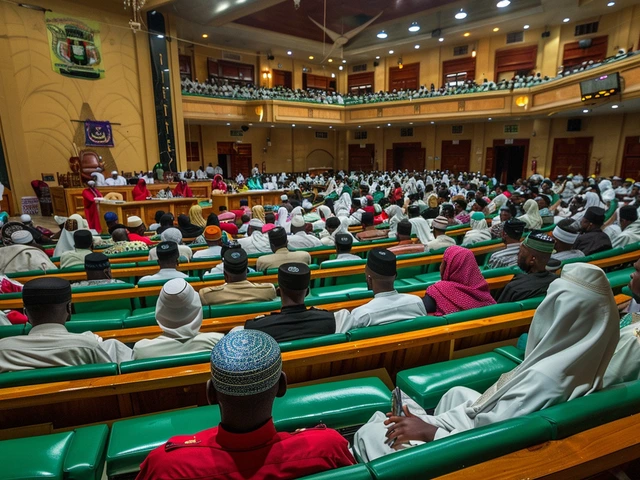In a decisive move aimed at restructuring his Cabinet, President William Ruto has made substantial changes to his team of nominees. On July 19, Ruto surprised many by moving Aden Duale from his initial position as Defence Minister to the Environment Ministry, appointing Soipan Tuya as the new head of Defence. This significant announcement was formally communicated to the Speaker of the National Assembly, Moses Wetang'ula, signaling a strategic recalibration of roles within the administration.
The reshuffle underscores President Ruto's commitment to refining the effectiveness and reach of his Cabinet. Duale, who has served in various capacities within the government, expressed his gratitude for the new opportunity. He conveyed his readiness to tackle the challenges ahead in his new role within the Environment Ministry.
Duale's transfer to the Environment Ministry is particularly noteworthy, given the pressing environmental concerns facing the nation. Issues such as climate change, deforestation, and waste management require robust and responsive leadership. Duale's considerable experience in governance could usher in new initiatives aimed at addressing these critical issues. The transition comes at a time when there's a growing global emphasis on sustainable practices, and Kenya aims to lead by example in the region.
Soipan Tuya's appointment as Defence Minister raises the stakes for the incoming administration. Tuya, known for her firm stance on national security and defense policies, brings a wealth of experience to the portfolio. Her leadership will be crucial in addressing ongoing security challenges, including terrorism and internal conflicts. Her appointment is seen as a strategic move to bolster the country's defense mechanisms and ensure national stability.
The reshuffle, which includes 11 Cabinet nominees announced on July 19, reflects President Ruto's vision for a dynamic and responsive government. Each nominee is expected to bring fresh perspectives and vigor to their respective ministries. The changes come at a critical time when the country is navigating complex socio-economic challenges exacerbated by global events. Effective leadership within key ministries will be vital in charting a resilient path forward for the nation.
The reassignment of roles is not solely a bureaucratic exercise but aligns with the president's broader objectives of enhancing government performance. Each ministry's strategic alignment and focus will be key components in delivering the administration's promises to the citizens. With the legislative framework in place, the nominees, including Duale and Tuya, will be vetted by the Committee on Appointments within 28 days, ensuring they meet the criteria to effectively serve in their new capacities.
This period of vetting will be critical, as the Committee evaluates the nominees based on their qualifications, experience, and vision for the respective ministries. The vetting process not only ensures transparency but also instills confidence among the citizens regarding the administration's commitment to accountability and excellence.
The political repercussions of this reshuffle are multifaceted. It showcases Ruto's assertive leadership style and his determination to optimize the functionality of his Cabinet. The public's response to these changes will be closely watched, as it could influence the administration's standing and the political landscape in the coming years.
As the nation anticipates the outcomes of this reshuffle, the focus remains on how these new appointments will translate into tangible improvements in governance and service delivery. Both Duale and Tuya, along with their fellow nominees, face the daunting task of meeting high expectations while navigating their respective ministries' complexities.
Indeed, these strategic cabinet moves are more than just internal adjustments; they represent a fresh chapter in Kenya's governance aimed at achieving sustainable development and national security. The incoming ministers will undoubtedly play pivotal roles in shaping the future trajectory of the country.







Eduardo Lopez
President Ruto’s latest Cabinet shuffle reads like a staged drama, a self‑congratulatory recital of power‑play rather than a sincere effort to address Kenya’s mounting crises. By swapping Aden Duale and Soipan Tuya, the administration signals a flimsy commitment to environmental stewardship while pretending to bolster national security. Such theatrical gestures betray a deeper moral vacancy that does nothing to inspire confidence in genuine governance.
Nancy Perez de Lezama
While the reshuffle may appear merely procedural, it carries significant implications for policy continuity. The government should ensure that the new ministers receive robust support to meet their mandates effectively.
Matt Heitz
The strategic redeployment of Duale to the Environment Ministry and the elevation of Tuya to Defence must be evaluated through the lens of national interest and security doctrine. From a geopolitical standpoint, the realignment reflects an attempt to consolidate internal stability while projecting a veneer of environmental responsibility. However, the nomenclature masks a deeper concern: the administration’s reluctance to empower technocratic expertise over partisan loyalty. Such a maneuver can undermine the implementation of climate‑adaptation frameworks that are critical for Kenya’s future. Moreover, the defence portfolio now rests on a figure whose prior legislative record suggests a propensity for confrontational posturing, which could exacerbate regional tensions. In sum, the reshuffle is less about functional optimization and more about reinforcing a narrative of decisive leadership.
Susan Mark
It’s worth noting that the environmental challenges Kenya faces require interdisciplinary collaboration, not just ministerial rebranding. Duale’s governance experience could bring valuable administrative insights, provided he leverages the expertise of climate scientists and NGOs. Likewise, Tuya’s firm stance on security could benefit from integrating community‑based resilience strategies. A balanced approach that mixes strong leadership with specialist input will likely yield the most sustainable outcomes.
Jason Jennings
Another pointless shuffle, typical of Ruto's empty promises.
Diego Vargas
The recent cabinet reshuffle in Kenya, while making headlines, is in fact a textbook example of political tokenism that I have witnessed countless times across different administrations. First, the decision to move Aden Duale from defence to the enviroment ministry is not grounded in his demonstrated competence in climate policy, as his resume is riddled with defence‑centric initiatives and little to no experience in ecological governance. Second, the promotion of Soipan Tuya to defence head appears to be a superficial attempt to showcase gender inclusivity without addressing the underlying strategic deficiencies that have plagued Kenya's security apparatus. Third, the timing of the reshuffle-right before the vetting committee convenes-suggests an ulterior motive to pre‑emptively shape public perception rather than to genuinely improve ministerial performance. Fourth, one must consider the broader geopolitical context: Kenya is currently navigating complex regional security dynamics, and swapping ministers without a clear continuity plan can destabilize ongoing operations. Fifth, the environment ministry is at a critical juncture, battling deforestation, waste mismanagement, and the impacts of climate change; appointing a politician without a track record in sustainable development is akin to putting a novice chef in charge of a Michelin‑star kitchen. Sixth, there is a glaring lack of stakeholder consultation, as NGOs and civil society groups have been notably absent from the decision‑making process. Seventh, the media narrative surrounding the reshuffle has been heavily curated, with official statements emphasizing "fresh perspectives" while ignoring the substantive policy gaps these changes exacerbate. Eighth, the recurring pattern of reshuffling for the sake of optics rather than efficacy has historically led to policy discontinuity and bureaucratic inertia. Ninth, I have personally studied the outcomes of similar ministerial swaps in other African nations, and the data consistently shows a dip in performance metrics during the transition period. Tenth, the current administration’s communication strategy appears to prioritize short‑term political gain over long‑term governance stability. Eleventh, the legislative vetting process, while designed to ensure accountability, often becomes a perfunctory checkpoint when the appointments are already politically sealed. Twelfth, the public’s trust in governmental institutions erodes further when such high‑profile changes are perceived as superficial. Thirteenth, if the goal is to genuinely address Kenya's environmental challenges, the government should consider appointing a technocrat with a proven record in climate science. Likewise, the defence portfolio would benefit from a leader with a comprehensive understanding of both conventional and asymmetric warfare tactics. Ultimately, the success of these appointments will hinge not on the titles exchanged but on the willingness of the ministers to engage with expert communities and adopt evidence‑based policies. Lastly, I would advise the president to prioritize competence and continuity over symbolic gestures if he truly wishes to propel Kenya forward.
Alex Lee
Sounds like a braggy rant that adds nothing, just more nonsense.